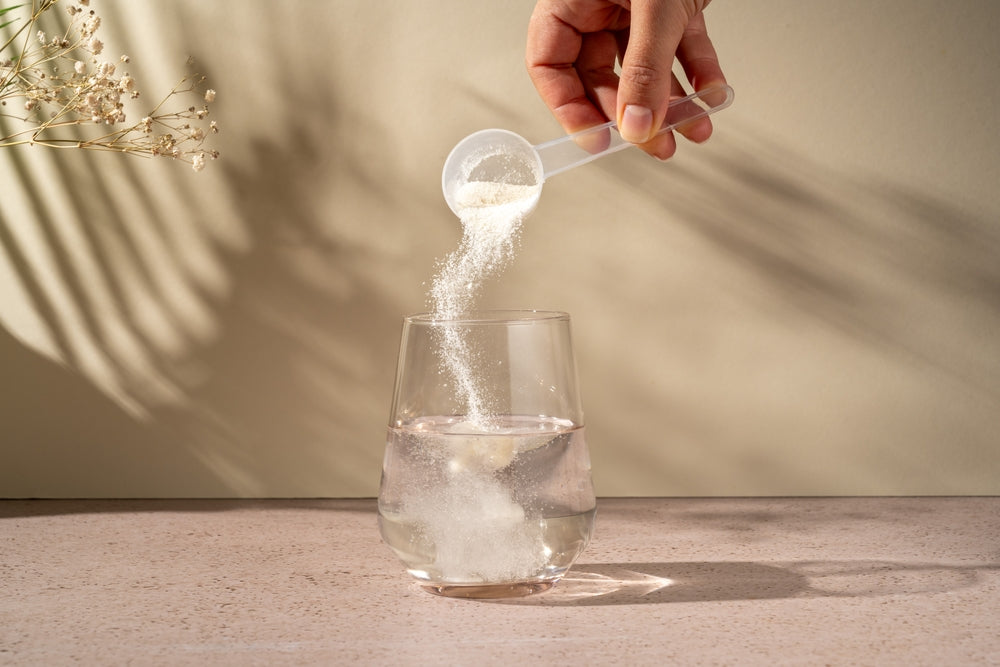Collagen is often presented as the key ingredient to maintain radiant skin and fight the signs of aging. But between natural production that decreases with age and the promises of dietary supplements, it is essential to understand its real role before choosing a supplement.
What is collagen and what role does it play for the skin?
Collagen is a protein naturally produced by the body, also called endogenous collagen. It is the most abundant protein in our body: it makes up nearly 30% of total proteins and forms the support framework of many tissues, including skin, joints, bones, and tendons.
In the skin, collagen acts like a real scaffold. It ensures firmness, elasticity, and the ability to remain supple and resistant against external aggressions. Sufficient collagen production therefore helps maintain smooth, plump skin, while a gradual decline leads to the appearance of wrinkles, sagging, and loss of radiance.
This structural and protective function explains why collagen supplements for the skin are becoming more and more popular: they aim to compensate for the natural decline in production and support skin beauty from within.
Are collagen supplements really effective?
In recent years, skin collagen supplements, especially marine collagen, have been the subject of many studies. The results are encouraging: several clinical trials show that regular intake of hydrolyzed collagen helps improve skin elasticity, hydration levels, and overall appearance, with a visible reduction in fine lines.
These effects seem particularly noticeable after 8 to 12 weeks of daily use and are more evident with marine collagen, known for its good bioavailability. However, results vary from person to person, depending on dosage, duration of use, and product quality.
Collagen supplements can provide real support for smoother, firmer skin, but they do not replace a healthy lifestyle or appropriate skincare.
Why does collagen production decrease with age?
Over time, endogenous collagen production naturally slows down. As early as our twenties, the body produces a little less each year, gradually leading to a loss of firmness and elasticity of the skin.
This phenomenon is accentuated by certain external factors:
-
repeated UV exposure, which degrades collagen fibres,
-
oxidative stress linked to pollution and poor diet,
-
smoking, which weakens skin structure,
-
lack of sleep and chronic fatigue.
These combined elements explain the progressive appearance of wrinkles, sagging, and reduced radiance. This is why collagen supplements are increasingly used to compensate for this decline, alongside skincare routines and a healthy lifestyle.
Marine collagen or other forms: which one should you choose?
The choice of a collagen supplement for the skin depends both on your needs and preferences.
Marine collagen is recognized for its high bioavailability, meaning its ability to be quickly absorbed by the body. It is particularly valued for supporting hydration, elasticity, and skin radiance. For example, Whole Body Marine Collagen with hyaluronic acid and biotin combines marine collagen with key nutrients to maximize skin benefits.
Bovine or porcine collagen is more often used to support joints and bones, but it also contributes to skin health. It mainly contains type I and III collagen, useful for skin firmness. A practical option is Preferred Nutrition Bovine Collagen Peptides, available in various formats, suitable for smoothies or hot drinks.
Whichever type you choose, always check product purity, certification, and collagen peptide dosage to ensure real effectiveness.
How to properly use collagen supplements?
For visible results, consistency is key. Most studies show improvements in skin after 8 to 12 weeks of daily collagen intake. Effective doses generally range between 2.5 g and 10 g per day, depending on product concentration.
It is also recommended to combine collagen with vitamin C, as it naturally stimulates endogenous collagen production. A product like Natural Factors C Extra+ Quercetin can be a good option to reinforce this synergy.
In everyday life, you can easily incorporate collagen:
-
into coffee or smoothies with powders such as Whole Body Pomegranate Collagen,
-
in protein drink recipes,
-
or with ready-to-drink liquid formulas.
For lasting results, combine your collagen intake with a healthy lifestyle: a diet rich in antioxidants, sufficient hydration, restorative sleep, and daily sun protection.
FAQ on collagen for skin
Does collagen really make wrinkles disappear?
No, collagen supplements do not completely erase wrinkles. However, they can help reduce their appearance by improving skin elasticity and hydration, making it look smoother and firmer.
What is the difference between marine and bovine collagen?
Marine collagen is known for its bioavailability and targeted action on the skin, while bovine collagen also contains type I and III collagen, beneficial for skin firmness but often used in parallel for joints. The choice depends on your priorities (skin, joints, or both).
Can I take collagen every day?
Yes, collagen supplements are designed for daily use. For results, consistency is essential: a course of at least 8 to 12 weeks is generally recommended.
How long before seeing results on the skin?
Studies show visible effects after about 8 weeks, with progressive improvement in elasticity, hydration, and radiance. Results may vary depending on product quality, dosage, and lifestyle.
Collagen and lifestyle: a holistic approach for radiant skin
Collagen supplements for the skin can support elasticity, hydration, and radiance, but their effectiveness is even more pronounced when combined with a holistic approach. A balanced diet, rich in antioxidants, vitamin C, and proteins, promotes endogenous collagen production. Daily hydration, restorative sleep, and proper sun protection are also essential to preserve youthful skin.
To complement your skincare and wellness habits, explore our selection of collagen supplements and choose the formula that will help you maintain radiant skin day after day.


